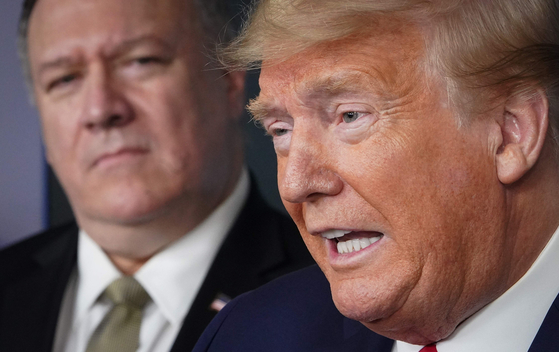Donald Trump, who had not left a week of resignation, continued sanctions against Chinese companies.
On the 14th (local time), Reuters reported that the U.S. government put nine companies, including Chinese mobile phone maker Xiaomi, on a list of “blacklists” that are subject to investment bans, claiming they are believed to be related to the Chinese military.
![Trump's US administration added nine Chinese companies, including Xiaomi, to the blacklist. President Donald Trump (right) and US Secretary of State Mike Pompeo (left) [AFP=연합뉴스]](https://i0.wp.com/pds.joins.com/news/component/htmlphoto_mmdata/202101/15/0abb3e54-a422-49b3-b08d-eb464863130e.jpg?w=560&ssl=1)
Trump’s US administration added nine Chinese companies, including Xiaomi, to the blacklist. President Donald Trump (right) and US Secretary of State Mike Pompeo (left) [AFP=연합뉴스]
The U.S. Department of Defense added to the blacklist, saying that 9 companies, including Xiaomi and the state-run aircraft manufacturer China Commercial Aviation Corporation (COMAC), appear to be used for military purposes.
These Chinese companies are subject to an investment ban, and US investors must sell their stakes in the Chinese companies on the list by November 11, the news agency reported. According to the AFP news agency on the 15th, Xiaomi’s share price plunged more than 11% during the day on the Hong Kong stock market.
Xiaomi has grown 20 times in sales over the past seven years, with its price/performance ratio. Recently, the Chinese company Huawei, a target of the US government, has been increasing its influence by taking advantage of the vacancy. Bloomberg News reported that Xiaomi beat Apple in global smartphone sales as of the third quarter of last year.
![Chinese mobile phone maker Xiaomi is on the blacklist of the US government. [로이터=연합뉴스]](https://i0.wp.com/pds.joins.com/news/component/htmlphoto_mmdata/202101/15/92520cfe-3884-4626-97ad-7a650a3cb82d.jpg?w=560&ssl=1)
Chinese mobile phone maker Xiaomi is on the blacklist of the US government. [로이터=연합뉴스]
Earlier, in November last year, President Trump signed an executive order banning American investment in companies affiliated with the Chinese military. To date, 35 companies, including China’s largest semiconductor company SMIC, have been blacklisted.
![The US State Department has imposed additional sanctions on visa restrictions on executives of state-owned companies in China, taking the issue of China's military base in the South China Sea. Logo of China Offshore Petroleum, one of the three largest Chinese oil companies drilling in the South China Sea [AFP=연합뉴스]](https://i0.wp.com/pds.joins.com/news/component/htmlphoto_mmdata/202101/15/aaad18ac-46c5-4567-8295-86bd69442ff0.jpg?w=560&ssl=1)
The US State Department has imposed additional sanctions on visa restrictions on executives of state-owned companies in China, taking the issue of China’s military base in the South China Sea. Logo of China Offshore Petroleum, one of the three largest Chinese oil companies drilling in the South China Sea [AFP=연합뉴스]
The US State Department also imposed additional sanctions, such as visa restrictions, on the officials of the Chinese Communist Party and the People’s Liberation Army, and executives of state-owned enterprises, taking the issue of China’s military base in the South China Sea.
According to Bloomberg News, the US Department of Commerce criticized the drilling of the South China Sea by CNOOC, China’s three largest oil company.
“CNOOC is acting like a bully for the Chinese People’s Liberation Army trying to scare neighboring countries,” said Commerce Secretary Wilbur Ross. “China’s reckless and hostile actions in the South China Sea and aggressive actions to secure sensitive intellectual property and technology for militarization are a threat to US national security.”
![China Ocean Petroleum Corporation (CNOOC) employees drilling oil at Liwan 6-1-1 oil well (1500m below sea level), 320km southeast of Hong Kong. [중앙포토]](https://i0.wp.com/pds.joins.com/news/component/htmlphoto_mmdata/202101/15/4cc804c6-9500-4e6a-b661-f6cc0474d9d6.jpg?w=560&ssl=1)
China Ocean Petroleum Corporation (CNOOC) employees drilling oil at Liwan 6-1-1 oil well (1500m below sea level), 320km southeast of Hong Kong. [중앙포토]
Secretary of State Mike Pompeo also criticized in a statement that “the CCP is using CNOOC and other state-owned enterprises as weapons for illegally applying the’gudan ship’.”
China draws nine lines (gudan line) in the South China Sea, claiming that most are its territorial waters. China has also built an artificial island nearby, causing conflict with neighboring countries such as the Philippines, Vietnam, and Malaysia.
Minister Pompeo said, “The United States is in a position with Southeast Asian countries to protect sovereign rights and interests in accordance with international law.”
![US Secretary of Commerce Wilbur Ross [중앙포토]](https://i0.wp.com/pds.joins.com/news/component/htmlphoto_mmdata/202101/15/ec149eff-8665-417c-8e65-7d8c157e31cf.jpg?w=560&ssl=1)
US Secretary of Commerce Wilbur Ross [중앙포토]
Meanwhile, the US Department of Commerce also designated Nicholas Maduro’s regimes in China, Iran, Russia, North Korea, Cuba and Venezuela as an enemy to protect the supply chain of information and communications technology.
If the communication technology and equipment of these countries poses a threat to the national security of the United States, it can be banned, and will take effect 60 days after the publication of the Gazette. Several countries have been pointed out, but the key target seems to be China. In the case of North Korea and Russia, it is possible that successive cyber attacks have become a problem.
The Wall Street Journal (WSJ) reported that the Trump administration’s decision on whether or not to implement the regulation will be made by the Joe Biden administration, scheduled to take office on the 20th. Biden said it would reduce US reliance on Chinese technology, but has yet to come up with detailed plans, WSJ added.
Reporter Seo Yujin [email protected]
